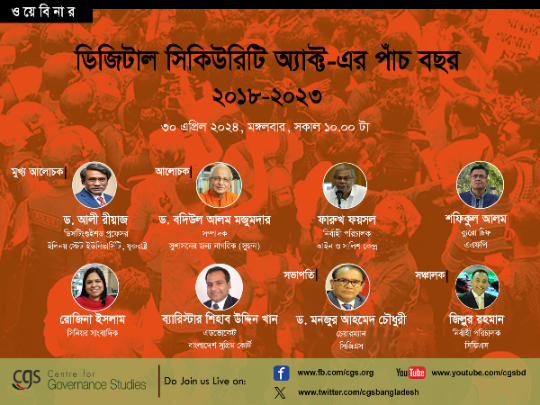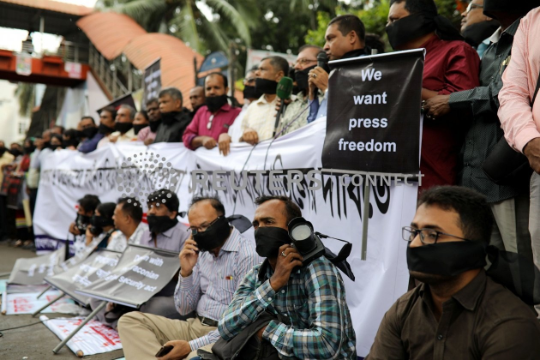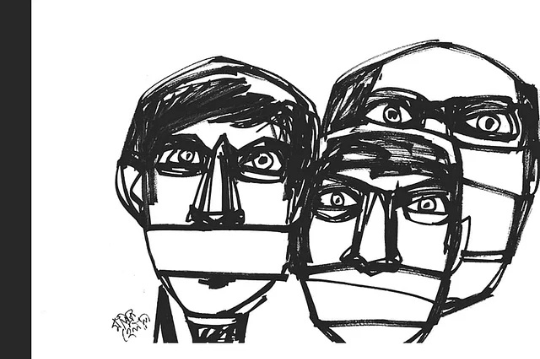The Ordeal: Five years of the Digital Security Act 2018-2023
Published on 02/05/2024

The Digital Security Act (DSA) has been in practice for five years from 2018 to 2023.During these five years, 7001 cases were filed under the act but researchers argue that the number is much bigger in reality. Moreover, information on charges, arrests, trials, and sentences were not disclosed. Disrupting democracy, hampering human rights, and used as a weapon, the law has been explicitly criticized by civil society organizations (CSOs), national and international humanitarian organizations, lawyers, researchers, and also the mass. Despite this criticism, instead of abolishing the act, the government has reformed it into the Cyber Security Act (CSA) in 2023.
The Centre for Governance Studies (CGS) organized a webinar on the Digital Security Act 2018 titled “Five Years of the Digital Security Act: 2018-2023”,on 30 April, 2024. The webinar aimed to discuss the progression and transformation of the law over the past five years, as well as the serious negative repercussions that have emerged as a result of its implementation.
The webinar featured distinguished experts on various fields to provide a comprehensive perspective. Zillur Rahman, Executive Director, CGS, moderated the webinar. The esteemed guests included Dr. Ali Riaz, Distinguished Professor at the Department of Politics and Government, Illinois State University, USA; Dr. BadiulAlam Majumdar, Secretary, SHUJAN; Faruq Faisel, Executive Director, Ain o Salish Kendra (ASK); Shafiqul Alam, Bureau Chief, AFP; Barrister Shihab UddinKhan, Advocate, Supreme Court of Bangladesh; and Dr. Manjur Ahmed Chowdhury, Chairman, CGS. Renowned journalists from various news outlets also participated in the event. The webinar concluded with a Q&A session, allowing for a deeper exploration of the key issues raised by the panelists.
Highlighting a critical point that the DSA has been categorized as “Draconian Law” by the United Nations Office of the High Commissioner for Human Rights (OHCHR),Zillur Rahman emphasized that people need to be aware of their human and civil rights along with being able to practice democracy freely, at the beginning of the webinar. Expressing his concerns about the future, he mentioned the proposed Data Protection Act and how it would do the opposite of what its name suggests. He called for collaborative efforts to address the immediate and potential threats to the rule of law, civil rights, human rights, and democratic freedoms in Bangladesh, which are essential for the people to live their lives with security and dignity.
Dr. Ali Riaz presented the report titled “The Ordeal: Five Years of the Digital Security Act 2018-2023”shedding light on the discrepancies between government-reported information and the actual number of cases and detentions under the DSA. He revealed a concerning pattern: while individuals from various professions faced charges, politicians and journalists were disproportionately targeted under the Act. His analysis, spanning five years of the DSA's implementation, highlighted several critical issues. These included a concerning lack of transparency surrounding the application of the law, a troubling prevalence of abuse during pre-trial detention, and the disturbing reality of cases filed against minors.To address these issues, Dr. Riaz proposed the establishment of an independent committee. This committee, he argued, would be empowered to conduct thorough investigations into the validity of DSA cases. Additionally, he urged the immediate release of those currently detained under the Act. He emphasized the ongoing ordeal faced by the accused, their families, and friends, stating that "As long as these legal proceedings remain unresolved, a state of continuous anguish will persist for those caught in the web of the DSA." Ending his speech with a powerful statement, he said, “If there is no rule of law and no mechanism to establish human rights, then the people in power will create laws like DSA and use them as their weapons of choice.”
Max Weber a renowned German sociologist and political scientist generated the idea that modern states will use LEGITMATE power to gain control over the affairs of the country and to maintain law and order. Building upon this concept, BadiulAlam Majumdar weighed in on the DSA, arguing that while the DSA might be an attempt to exert control, it falls far short of being a legitimate exercise of state power.bolstered his argument by referencing the case of Khadijatul Kubra, a situation that exemplifies the precarious state of freedom of speech in Bangladesh. He employed strong language, characterizing the DSA as a tool for "weaponizing the law" and a significant threat to the fundamental right to freedom of expression enshrined in Article 39 of the Constitution. He further emphasized the opposition should be able to play its meaningful part freely and laws like DSA should be scrapped so that the citizens can properly exercise their rights.
Pointing out that the current government has been in power 15 years, Faruq Faisel said that the 5 years that the DSA was implemented alone is enough to put a big stain of disgrace on the regime. In his remarks, he emphasized the detrimental impact of the DSA on both journalists and the general public, creating a climate of fear that forces individuals to self-censor. This, in turn, has severely disrupted the free press, a cornerstone of a healthy democracy. He also mentioned how concerned various international humanitarian organizations such as Article 19, his former workplace, were as the government was abusing the DSA to suppress human rights.
Shafiqul Alam expressed a critical view of the DSA, suggesting that its underlying purpose was to stifle free speech. He elaborated on this point by suggesting that the rise of free speech on digital platforms prompted the authorities to implement a mechanism for exerting control over this online discourse. He advocated for a more drastic solution than mere reform, calling for the complete abolition of the law. He concluded with a pessimistic outlook, stating that regardless of its name – whether the DSA or a replacement like the CSA – any such legislation is inherently susceptible to abuse. He further argued such laws work for developed democracies with strong human rights protections, but in Bangladesh's fragile context, they're prone to be misused.
Barrister Shihab Uddin Khan raised concerns about the controversial Section 57 of the Information and Communication Technology (ICT) Act. He pointed out that the DSA and its successor, the CSA, essentially incorporated this disputed provision, albeit in a fragmented manner. He elaborated that Section 57 was divided into four parts and dispersed across various articles within the DSA (25, 28, 29, and 31). He argued that this fragmentation creates opportunities for misinterpretations and misapplications of the law. Furthermore, he emphasized that this approach contradicts the fundamental right to freedom of expression enshrined in Article 39(2) of the Constitution.
Dr. Manjur Ahmed Chowdhury delivered the concluding remarks with a somber tone. He highlighted the fact that after the DSA was put into practice, it has instilled a pervasive sense of fear among the population. People live in constant anxiety, unsure of what action of theirs might be deemed criminal. He stated that this has severely hampered the democracy in our country. Dr Manjur delivered a powerful call to action, urging everyone to speak up any way they can against the injustices these types of acts have brought. He also emphasized the importance of firmly participating in the movement to reestablish democracy in our country, for it is the only way we can get back our freedom of speech and life.




